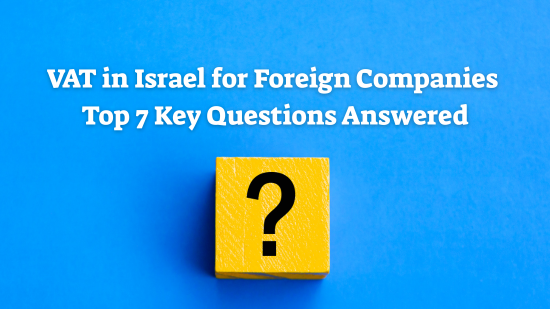
VAT in Israel for Foreign Companies – Top 7 Key Questions Answered
When international businesses consider operating in Israel, one of the most common challenges they face is understanding the Israeli Value Added Tax (VAT) system. The recent changes in VAT regulations offer significant benefits for foreign companies, especially in cases where VAT has been double-paid—once at customs for imported goods and again for services provided within Israel.
To help foreign business leaders, CFOs, and business development managers navigate these complexities, we’ve compiled a list of 7 frequently asked questions, along with expert answers from an international tax and VAT specialist.
-
Do Foreign Companies Need to Register for VAT in Israel?
Answer: Any foreign company conducting business in Israel may be required to register for VAT, even if it does not have a local subsidiary or permanent establishment. A company that sells goods or provides services within Israel must assess whether its activities trigger VAT obligations.
Typically, companies must appoint a fiscal representative in Israel who will handle VAT reporting and compliance. However, under recent VAT rulings, certain B2B transactions with foreign companies may qualify for a 0% VAT rate, depending on the type of service and the client’s location.
-
What Happens When Importing Goods into Israel?
Answer: When a foreign company imports goods into Israel, VAT will charge the company with customs based on the declared value of the goods. However, an important recent ruling states that if a foreign company provides services that are part of the customs value of imported goods (e.g., warranty repairs, advertising, or marketing services related to the goods), those services may qualify for a 0% VAT rate, ensuring that the company you will not pay VAT twice.
If a foreign business wrongly paid VAT at customs and related services, there may be an opportunity to claim a retroactive VAT refund.
-
How often do foreign companies need to report VAT in Israel?
Answer: VAT reporting in Israel is conducted monthly or bi-monthly, depending on the volume of business activity. Any foreign entity with an Israeli VAT registration must submit reports regularly and ensure compliance with local tax regulations.
-
What VAT benefits exist for foreign companies providing services to Israeli businesses?
Answer: Under Israeli VAT law, services provided by an Israeli company to a foreign company may qualify for a 0% VAT rate, meaning that VAT will charge the company 0% VAT, but the company will still be able to deduct input VAT.
However, there are exceptions:
- If the service relates to Israeli customers or assets located in Israel, a standard 18% VAT applies.
- If the service is consumed outside Israel and provided to a foreign entity, 0% VAT may apply.
This distinction is crucial, and businesses should assess their contracts carefully to determine the applicable VAT treatment.
-
What is the difference between 0% VAT and VAT exemption in Israel?
Answer: Many foreign businesses assume that 0% VAT and VAT exemption are the same, but they have crucial differences:
- 0% VAT (Zero-Rated VAT): A transaction subject to VAT at a 0% rate means that the business must still report the transaction to the Israeli Tax Authority but does not charge VAT to its client. The key advantage is that the business can still deduct VAT on related expenses (input VAT), reducing overall tax costs. Exported goods and specific services to foreign clients may qualify for a 0% VAT rate.
- VAT Exemption: A VAT-exempt transaction does not require VAT reporting, but businesses providing exempt services cannot reclaim VAT on their expenses. That typically applies to small businesses in Israel classified as “exempt dealers” and to certain types of financial and educational services.
Qualifying for 0% VAT is generally more advantageous than being VAT-exempt for foreign companies, as it allows for VAT recovery on business expenses.
-
Can a foreign company reclaim VAT paid in Israel?
Answer: Under certain conditions, foreign companies may reclaim input VAT paid in Israel. That typically applies when:
- The company has no permanent establishment in Israel but incurred VAT on local expenses.
- The expenses relate to business activities that qualify for VAT deductions (e.g., business travel, marketing, consulting fees).
- The company properly submits VAT refund requests under Israel’s reciprocal VAT refund system.
Given the complexities of VAT refund applications, working with a tax expert can significantly improve the chances of a successful claim.
-
Should foreign companies seek professional VAT consultation in Israel?
Answer: Absolutely. VAT compliance mistakes can be costly. Lack of understanding and control over the nuances of Israeli VAT law and its ongoing updates may result in unnecessary payments, fines, or missed refund opportunities.
With the recent tax rulings, foreign businesses operating in Israel may be eligible for VAT refunds and exemptions, reducing their overall tax burden. However, these benefits require proper structuring and documentation.
At Auren, we specialize in helping international businesses optimize their VAT compliance in Israel. Our team of experts is prepared and looking forward to guiding you. determining your VAT liabilities, eligibility for 0% VAT, and opportunities to recover overpaid taxes.
Contact us today for a consultation on maximizing your tax efficiency in Israel.
Why Work With AUREN?
- Expertise in Israeli and international tax law
- Proven experience in handling VAT exemptions & refunds
- Comprehensive compliance support for foreign businesses in Israel
Let’s make sure your company benefits from Israel’s VAT system rather than being burdened by it.
Chairman of AUREN Israel


